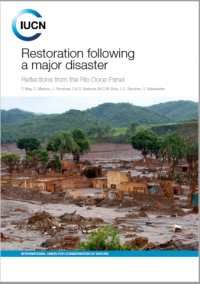Complete Title
Restoration following a major disaster : reflections from the Rio Doce Panel
Description
Independent Scientific and Technical Advisory Panels (ISTAPs) have been established to help address a range of controversial conservation and development issues that have emerged with growing frequency and complexity at national and global levels. This report is intended to contribute to discussion of ways to improve the effectiveness of ISTAPs by outlining lessons learned by the Rio Doce Panel, an ISTAP set up in the wake of the 2015 Fundão iron tailings Dam collapse, widely considered one of Brazil’s worst environmental disasters. The Panel’s recommendations were based on three complementary perspectives: a long-term vision, a landscape approach, and the application of Nature-based Solutions (NbS).
Organization(s)
Imprint
Gland, Switzerland : IUCN, 2023
Edition
1
Physical Description
x, 45p. : ill.
Notes
Including bibliographic references.
Geographic keywords
Call number
More information 

Publisher
Bibliographic level
Monograph/item
Number of library copies
2
Available from email
renata.bennet@iucn.org

